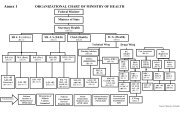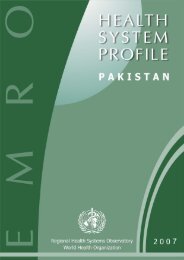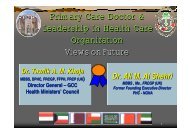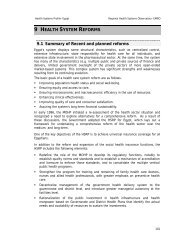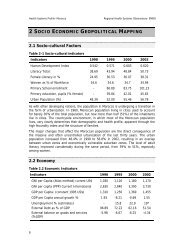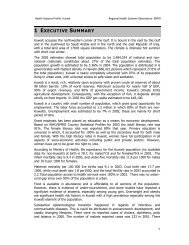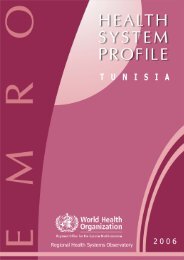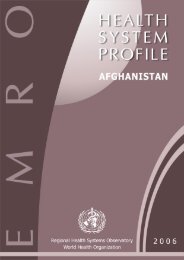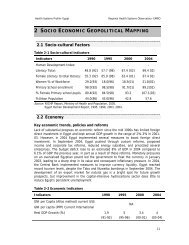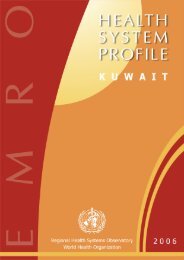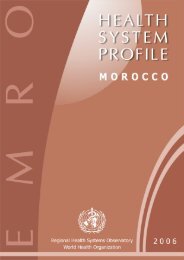Social determinants of health in countries in conflict - What is GIS ...
Social determinants of health in countries in conflict - What is GIS ...
Social determinants of health in countries in conflict - What is GIS ...
Create successful ePaper yourself
Turn your PDF publications into a flip-book with our unique Google optimized e-Paper software.
12 <strong>Social</strong> <strong>determ<strong>in</strong>ants</strong> <strong>of</strong> <strong>health</strong> <strong>in</strong> <strong>countries</strong> <strong>in</strong> <strong>conflict</strong><br />
<strong>in</strong>terconnectedness <strong>of</strong> the security <strong>of</strong> all people”, “the global community’s responsibility<br />
for everyone’s welfare”, “respect for the rule <strong>of</strong> law” and the “accountability <strong>of</strong><br />
governments for their actions” [2]. An ethical and human rights viewpo<strong>in</strong>t and the UN<br />
doctr<strong>in</strong>e <strong>of</strong> the “responsibility to protect” also motivates the documentation <strong>of</strong> the ways<br />
<strong>in</strong> which <strong>conflict</strong>s, such as those <strong>in</strong> the Region, have a devastat<strong>in</strong>g impact on the daily<br />
life, <strong>health</strong> and well-be<strong>in</strong>g <strong>of</strong> civilians caught up <strong>in</strong> <strong>conflict</strong> [3].<br />
In 1995, WHO establ<strong>is</strong>hed the Comm<strong>is</strong>sion on <strong>Social</strong> Determ<strong>in</strong>ants <strong>of</strong> Health <strong>in</strong><br />
recognition <strong>of</strong> the need to act to reverse the <strong>in</strong>creas<strong>in</strong>g differentials <strong>in</strong> <strong>health</strong> status,<br />
both with<strong>in</strong> and between <strong>countries</strong>, which have been observed s<strong>in</strong>ce the early 1990s.<br />
These differentials <strong>in</strong> <strong>health</strong> status can be attributed <strong>in</strong> large part to the differences <strong>in</strong> the<br />
conditions <strong>in</strong> which people live, and <strong>in</strong> their capabilities to lead <strong>health</strong>y lives. Armed<br />
<strong>conflict</strong> results <strong>in</strong> life sett<strong>in</strong>gs that produce high levels <strong>of</strong> mortality, d<strong>is</strong>ability and<br />
morbidity (physical as well as mental), directly or <strong>in</strong>directly result<strong>in</strong>g from the <strong>conflict</strong>,<br />
when compared to <strong>health</strong> outcomes <strong>in</strong> otherw<strong>is</strong>e comparable non-<strong>conflict</strong> sett<strong>in</strong>gs.<br />
The Comm<strong>is</strong>sion recognizes the d<strong>is</strong>t<strong>in</strong>ction between <strong>in</strong>equalities or d<strong>is</strong>parities <strong>in</strong><br />
<strong>health</strong>, and <strong>in</strong>equities. Inequities are def<strong>in</strong>ed as unfair or unjust differences <strong>in</strong> <strong>health</strong><br />
status that are avoidable, and hence, can be remedied [4,5]. In a <strong>conflict</strong> sett<strong>in</strong>g, <strong>health</strong><br />
<strong>in</strong>equalities are clearly <strong>in</strong>equities, <strong>in</strong> so far as differentials are the result <strong>of</strong> human action,<br />
rather than unavoidable biological or natural phenomena. A corollary <strong>of</strong> th<strong>is</strong> d<strong>is</strong>t<strong>in</strong>ction<br />
between <strong>in</strong>equalities and <strong>in</strong>equities <strong>in</strong> <strong>health</strong> <strong>is</strong> the recognition <strong>of</strong> WHO that <strong>health</strong> <strong>is</strong> a<br />
fundamental human right. Th<strong>is</strong> <strong>is</strong> currently expressed <strong>in</strong> terms <strong>of</strong> “the right to the highest<br />
atta<strong>in</strong>able standard <strong>of</strong> <strong>health</strong>” [6,7].<br />
The Comm<strong>is</strong>sion on <strong>Social</strong> Determ<strong>in</strong>ants <strong>of</strong> Health identifies several ways <strong>of</strong> look<strong>in</strong>g<br />
at social <strong>determ<strong>in</strong>ants</strong>. The structural <strong>determ<strong>in</strong>ants</strong> orig<strong>in</strong>ate <strong>in</strong> the socioeconomic and<br />
political context at the country and global level. These affect power relationships<br />
that determ<strong>in</strong>e the d<strong>is</strong>tribution <strong>of</strong> power, prestige and resources globally and with<strong>in</strong> a<br />
particular country or society, <strong>in</strong>clud<strong>in</strong>g those needed to ma<strong>in</strong>ta<strong>in</strong> <strong>health</strong> and social wellbe<strong>in</strong>g.<br />
These, <strong>in</strong> turn, result <strong>in</strong> <strong>in</strong>termediate <strong>determ<strong>in</strong>ants</strong>, the social relations, behaviours<br />
and psychological character<strong>is</strong>tics which can be seen as <strong>in</strong>termediaries between structural<br />
<strong>determ<strong>in</strong>ants</strong> and f<strong>in</strong>al <strong>health</strong> outcomes.<br />
The structural <strong>determ<strong>in</strong>ants</strong> <strong>of</strong> <strong>health</strong> <strong>in</strong> <strong>conflict</strong> sett<strong>in</strong>gs are especially important.<br />
They <strong>in</strong>clude the broad economic, cultural, h<strong>is</strong>torical, environmental and “political”<br />
<strong>determ<strong>in</strong>ants</strong> <strong>of</strong> <strong>health</strong>. All these <strong>determ<strong>in</strong>ants</strong> can be reflected <strong>in</strong> the <strong>in</strong>termediate, and<br />
strictly more “social” <strong>determ<strong>in</strong>ants</strong>, the conditions <strong>in</strong> which people live which affect<br />
their <strong>health</strong> status.<br />
Thematic areas can be identified as start<strong>in</strong>g po<strong>in</strong>ts for policy action and <strong>in</strong>tervention.<br />
These relate to specific life situations, especially groups or areas d<strong>is</strong>advantaged with<br />
regard to <strong>is</strong>sues such as gender <strong>in</strong>equity, employment, urban sett<strong>in</strong>gs, social exclusion<br />
and early childhood development, which are known, or suspected to be, associated<br />
SDH-chapters-<strong>countries</strong> <strong>in</strong> <strong>conflict</strong>-7 Oct.<strong>in</strong>dd 12 08/10/2008 14:24:48





